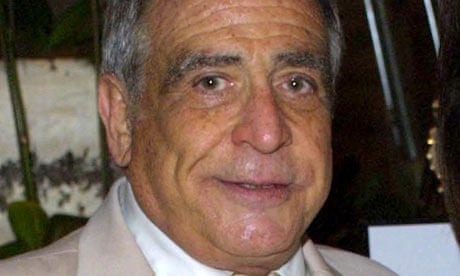If the talent required to be an exemplary film producer is the ability to instigate, facilitate and delegate, Daniel Melnick, who has died of lung cancer aged 77, qualified on all counts. In addition, like many of the producers of the golden age of Hollywood, Melnick knew how to take calculated risks and feel the pulse of the public. He had a sharp wit and didn't suffer fools gladly, especially during the short periods when he was head of production at MGM and Columbia studios.
Melnick first made his name as the brains behind Get Smart (1965-70), the hugely popular comedy series lampooning the secret-agent genre. Most episodes, which starred Don Adams as the blundering spy Maxwell Smart, working for Control, a secret US government counter-espionage agency, were written by Mel Brooks and Buck Henry.
Inspired by the success of NBC's The Man from U.N.C.L.E., Melnick approached Brooks and Henry to come up with something that capitalised on "the two biggest things in the entertainment world today – James Bond and Inspector Clouseau". The ABC network commissioned the series and a pilot was taped. However, ABC executives thought it "dirty and un-American", particularly an episode that blew up the Statue of Liberty, and the proposed series was dropped.
Undaunted, Melnick approached NBC, who commissioned a series without reservation. Get Smart went on to win seven Emmy awards, three of them for Adams. Melnick received his Emmy as producer (with David Susskind) for Death of a Salesman (1966) starring Lee J Cobb and Mildred Dunnock, who had created the roles on Broadway in 1949.
Melnick, who was born in New York City, was nine when his father, a Russian immigrant, died in a car crash. His mother, who remarried, encouraged her son's interest in theatre and sent him to New York's High School of Performing Arts. Later Melnick attended New York University and served in the army in the 1950s, when he produced entertainment for the troops at army camps.
During the 1950s and 60s, Melnick was a TV executive producer, greenlighting and scheduling programmes including The Fugitive, The Untouchables, The Flintstones and 77 Sunset Strip. His farewell to TV production was NYPD (1967-69), a gritty cop series with Jack Warden. From then on, Melnick concentrated on producing feature films.
His debut was highly controversial. Shot in Cornwall, Sam Peckinpah's Straw Dogs (1971) tells of how a man of reason (the initially mild-mannered and bespectacled Dustin Hoffman) is forced into violence against those who raped his wife (Susan George). Whatever its intentions, the film, which Pauline Kael called "a fascist classic", seemed to exult in eye-for-an-eye slaughter. Gordon Williams, the author of the original novel, stated: "I will never again sell one of my books to an American. It was horrific to see what they have done to my work. They've added a rape scene, an act of buggery, and lots of violence that was not in the book. A girl sitting next to me in the cinema vomited during one of the worst scenes and had to leave."
Nevertheless, Straw Dogs was a box-office hit, and Melnick was offered a job as head of worldwide production at MGM. There, he oversaw That's Entertainment! (1974) and its second part (1976), rousing tributes to the first 50 years of the studio, which received the most enthusiastic reviews of any of the company's movies in years. "While many may ponder the future of MGM," wrote Variety, "nobody can deny that it has one hell of a past." At least, though production fell to an average of four films a year, MGM under Melnick's aegis kept afloat with its hits The Sunshine Boys (1975) and Network (1976).
In 1978, Melnick served for nine months as president of Columbia after David Begelman was ousted in an embezzlement scandal. He was executive producer on Bob Fosse's All That Jazz (1979), a self-regarding razzle-dazzle production about the director's heart attack and relations with his family. In the same year, Melnick oversaw Kramer Vs Kramer, winner of five Oscars.
Melnick was a hands-on producer of more than a dozen other films, including Making Love (1982), considered groundbreaking at the time because of its plot: boy marries girl, boy leaves girl for boy. "We were flying in the face of one of the last taboos," Melnick said. More successful were the teen hit Footloose (1984), Roxanne (1987) and LA Story (1991), the last two starring Melnick's friend Steve Martin.
Melnick is survived by his son Peter, a film composer, from his 16-year marriage to Linda Rodgers, and a daughter from another relationship.
